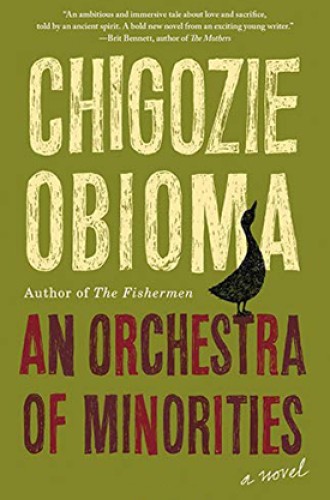Chigozie Obioma’s novel is at its core a tale of star-crossed romance, of one man’s subjection to a spiral of injustices encountered in his fight for the woman he can’t live without. But the account of Chinonso Solomon Olisa’s misfortunes is more than an ill-fated love story: it offers an exploration of natures both human and divine.
Chinonso’s tale is delivered by his chi—his attending spirit, simultaneously an invisible companion and an inherent part of himself. The chi has come before Chukwu, the creator, to explain and defend his host’s actions. The account begins by describing how Chinonso met Ndali, the woman who has inspired his endeavors. Only a long while after preventing Ndali, a stranger, from throwing herself from a bridge does Chinonso meet her again by chance. They come quickly to know and love each other. But Ndali’s wealthy family objects to her relationship with this uneducated poultry farmer and spares no means of humiliation in attempting to end it. Chinonso continues to try to prove his worthiness, allowing a childhood classmate to arrange for him to attend college in Cyprus. The criminal indignities he endures there, and later on his long quest to return to Ndali, bring to the story reflections on suffering, injustice, guilt, vengeance, and the order of the cosmos.
These reflections come courtesy of Chinonso’s chi, whose observations, delivered in the court of the gods, often feel as if they come straight out of the simile and metaphor of wisdom literature or ancient mythology. “The peace that concrete hope brings,” he pronounces, “is the unseen hand that lifts a man off a cliff over a pit of fire and returns him to the road from which he has veered. It is the rope that pulls a drowning man out of the deep sea and hauls him onto the deck of a boat to the breath of fresh air.” The particularities of Chinonso’s case inspire the chi to reflect upon the nature of humans and the structure of the universe, knowledge that has been gleaned from centuries’ worth of lives lived along with his various hosts. It’s less the content of these speculations that’s intriguing than what they reveal about the chi: that he doesn’t necessarily possess any more knowledge, insight, or common sense than his host and that he’s had to learn what life is about in the process of living it. Neither omnipotent nor all-knowing, with only limited capabilities for suasion and action, even after all he has seen, Chinonso’s chi still encounters things that puzzle and astound him.






